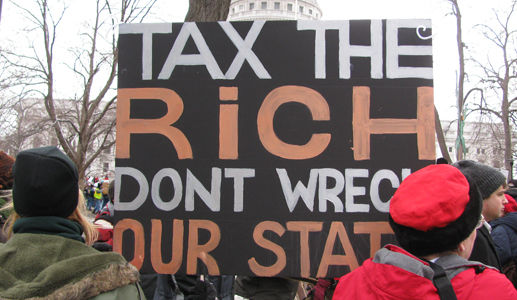
WASHINGTON – The union-led Democracy Initiative, founded and led by the Communications Workers – an initiative that racked up a big win in the last Congress – will tackle politicization of state courts, a senior strategist says.
“The battle over money in politics is one thing, but now it’s seeping down into the state courts,” added Greg Moore, of the NAACP National Voter Fund, at a January 13 forum in D.C. on corporate and political party spending in state judicial elections. “The Democracy Initiative is a good place to have that conversation” about the money’s impact, he added.
Moore discussed the idea at an American Constitution Society forum. ACS, a progressive legal group, tackles issues such as money in politics and voting rights. One main aim of the Democracy Initiative, led by CWA President Larry Cohen, is to curb the impact of money in politics and thus restore the rule of regular citizens, not corporations and the rich.
The Democracy Initiative’s biggest win so far was to force then-Senate Majority Leader Harry Reid, D-Nev., to change U.S. Senate filibuster rules to end GOP talkathons against presidential nominees, by requiring only 51, not 60, votes to halt debate. That cleared the way for Senate approval of a fully legal, full-5-member National Labor Relations Board.
The catch, as panel participants pointed out, is that what the NLRB, state legislatures or Congress can enact, state and federal judges can easily overturn. And while attention focuses on federal court nominations and decisions, state courts issue 98 percent of all rulings.
“They touch people in every way, involving civil and human rights,” said ACS President Caroline Fredericksen. That includes “who can marry whom, who can vote, whom police can detain and arrest, and who goes to jail and for how long.”
Voters elect 90 percent of state judges, panelists said. That makes their campaigns open to partisan and monetary manipulation.
“Money influences cases, including” cases involving “worker rights and environmental law,” said Alicia Bannon of the Brennan Center for Justice. Recent examples of state courts’ impact on workers include:
- The Louisiana Supreme Court – elected, like 38 other state high courts – overturned lower court rulings reinstating fired unionized New Orleans teachers to their jobs and awarding them millions of dollars in damages for being canned, despite their contract, after Hurricane Katrina smashed the city and its schools.
- The Indiana Supreme Court, again reversing lower courts, upheld the state’s new so-called “Right to Work” law. Operating Engineers Local 150 sued to overturn it, citing a state constitutional ban on forcing people to provide services for free. RTW laws let “free riders” get away with using union-negotiated services without having to pay dues or fees for them.
- A $3 million battle pitted corporations and the GOP on one side versus unions on the other over a key swing seat on the Wisconsin Supreme Court. It was part of the war between right wing GOP Gov. Scott Walker and labor over Walker’s destruction of collective bargaining rights for 400,000 Wisconsin state and local workers. Walker’s pick won, narrowly.
Those examples and many others show why politicization of the state courts by moneyed interests is important, ACS panelists said. And corporate spending on state court races multiplied enormously since the U.S. Supreme Court’s 2010 Citizens United ruling opened the floodgates for a tsunami of corporate cash in U.S. politics.
In one race, a GOP campaign finance committee dumped $300,000 into a circuit court election in Coles County, Mo., said Bert Brandenburg, director of ACS’ Justice at Stake project. There was a reason for that cash infusion, he told the puzzled crowd.
“Coles County includes Jefferson City,” the state capital, he explained. Its circuit court handles cases involving Missouri laws and agencies. The judge the Republican State Legislative Committee opposed had struck down the GOP legislature’s restrictive voter ID law.
“Courts are supposed to be impartial, not political…But elections are being turned into tools of political pressure,” Brandenburg added. And the “U.S. Supreme Court cannot be relied on as an ally” in the anti-politicization fight, warned Moore.
Besides working through the Democracy Initiative, panelists advocated other ways to battle corporate influence over state courts:
- Advocate merit selection of judges: Non-partisan panels would forward short bipartisan lists of qualified judicial candidates to governors. Brandenburg admitted “merit screening isn’t waterproof, but it’s the most effective method” to achieve qualified “diverse, and non-partisan” judges. “But that also typically requires changing a state constitution,” he said.
- Educate voters to pay attention to “down-ballot” races for legislatures – which some-times must approve judges before they face voters for retention or defeat – and judgeships. The catch with education, Fredericksen said, is that judicial races often lack information.
The panelists explained state judges are constrained from publicizing themselves, while outside political groups and the rich are free to circulate and air negative ads, especially charging judges with being soft on crime, to defeat judges who oppose the corporate agenda.
- Battle cynicism, by pointing out how voters in many states can overcome negative judicial campaigns. “A recent poll shows 96 percent of voters believe too much money impacts politics,” said Courtney Hight of the Sierra Club, another Democracy Initiative partner. “But 91 percent believe we can’t do anything about it…”That’s why we’ve come together – to make sure that money coming into the system is not just coming from 1,000 billionaires.”
Photo: Wisconsin Solidarity, March 5, 2011. People’s World Flicker.












Comments